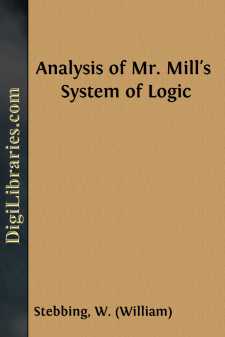Categories
- Antiques & Collectibles 13
- Architecture 36
- Art 48
- Bibles 22
- Biography & Autobiography 813
- Body, Mind & Spirit 142
- Business & Economics 28
- Children's Books 14
- Children's Fiction 11
- Computers 4
- Cooking 94
- Crafts & Hobbies 4
- Drama 346
- Education 46
- Family & Relationships 57
- Fiction 11829
- Games 19
- Gardening 17
- Health & Fitness 34
- History 1377
- House & Home 1
- Humor 147
- Juvenile Fiction 1873
- Juvenile Nonfiction 202
- Language Arts & Disciplines 88
- Law 16
- Literary Collections 686
- Literary Criticism 179
- Mathematics 13
- Medical 41
- Music 40
- Nature 179
- Non-Classifiable 1768
- Performing Arts 7
- Periodicals 1453
- Philosophy 64
- Photography 2
- Poetry 896
- Political Science 203
- Psychology 42
- Reference 154
- Religion 513
- Science 126
- Self-Help 84
- Social Science 81
- Sports & Recreation 34
- Study Aids 3
- Technology & Engineering 59
- Transportation 23
- Travel 463
- True Crime 29
Analysis of Mr. Mill's System of Logic
Description:
Excerpt
CHAPTER I.
ON THE NECESSITY OF COMMENCING WITH AN ANALYSIS OF LANGUAGE IN LOGIC.
The fact of Logic being a portion of the art of thinking, and of thought's chief instrument being words, is one reason why we must first inquire into the right use of words. But further, the import of propositions cannot really be examined apart from that of words; and (since whatever can be an object of belief assumes the form of a proposition, and in propositions all truth and error lie) this is a paramount reason why we must, as a preliminary, consider the import of names, the neglecting which, and confining ourselves to things, would indeed be to discard all past experience. The right method is, to take men's classifications of things as shown by names, correcting them as we proceed.
Hobbes's assertion that a name is a sign, not of a thing, but of our conception of it, is untrue (unless he merely mean that the conception, and not the thing itself, is imparted to the hearer); for we intend by a name, not only to make men conceive what we conceive, but to inform them what we believe as to the things themselves.
Names may be divided according to five principles of classification. The first way of dividing them is into General (not as equivalent to Collective) and Individual names; the second, into Concrete, i.e. the names of objects, and Abstract, i.e. the names of attributes (though Locke improperly extends the term to all names gained by abstraction, that is, to all general names). An abstract name is sometimes general, e.g. colour, and sometimes singular, e.g. milk-whiteness. It may be objected to calling attributes abstract, that also concrete adjectives, e.g. white, are attributes. But a word is the name of the things of which it can be predicated. Hence, white is the name of all things so coloured, given indeed because of the quality, but really the name of the thing, and no more the name of the quality than are names generally, since every one of them, if it signifies anything at all, must imply an attribute.
The third division is into Connotative and Non-connotative (the latter being wrongly called Absolute). By connotative are meant, not (as Mr. James Mill explains it) words which, pointing directly to one thing, tacitly refer to another, but words which denote a subject and imply an attribute; while non-connotatives signify a subject only, or attribute only. All concrete general names are connotative. They are also called denominative, because the subject denoted receives a common name (e.g. snow is named white) from the attribute connoted. Even some abstracts are connotative, for attributes may have attributes ascribed to them, and a word which denotes attributes may connote an attribute of them; e.g. fault connotes hurtfulness. Proper names, on the other hand, though concrete, are not connotative. They are merely distinguishing marks, given perhaps originally for a reason, but, when once given, independent of it, since the reason is proved to be no part of the sense of the word by the fact that the name is still used when the reason is forgotten....



